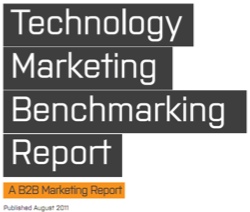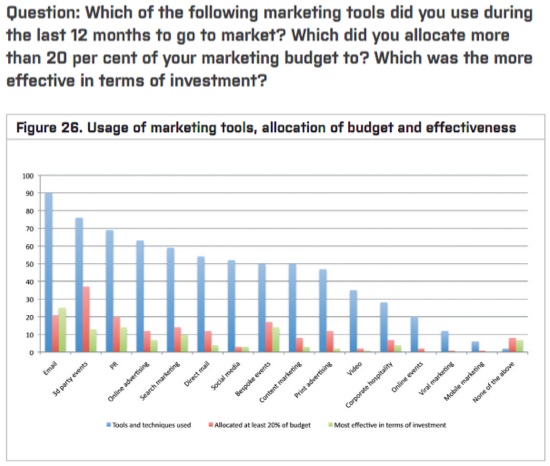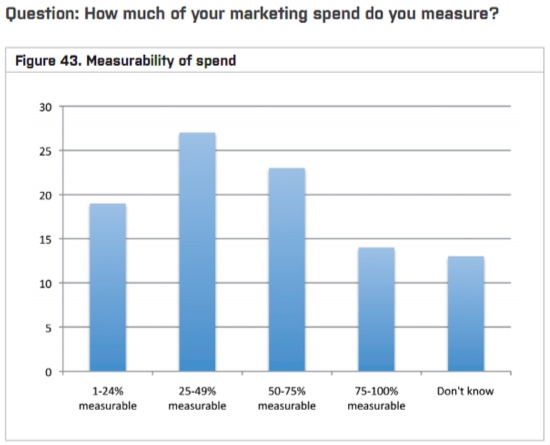Email a Winner, Measurement a Challenge for UK B2B Tech Marketers
August 11, 2011

According to the latest Technology Marketing Benchmarking Report from the UK’s B2B Marketing Magazine, email remains the most effective marketing tool in terms of ROI - but across the marketing mix as a whole, fewer than four out of ten of the companies surveyed claimed to be able to measure the effectiveness of the majority of their marketing investments. This new study contains some important pointers for all B2B technology marketers…
Emphasising Lead Creation - but What About Nurturing?
You can download a summary of the report - or buy the full copy - here. The survey (published August 2011) covered over 200 UK technology companies with turnovers ranging from under £5m to over a billion. Looking forward to the next 12 months, by far the most important objective for these organisations was to “create leads for sales conversion” - but the report points out that only 3% of the organisations surveyed also identified lead nurturing as a primary objective.
 Now, this is worrying statistic. It’s all very well focusing on generating leads, but what happens to the contacts that are not yet ready to buy? In high-value, complex B2B sales environments, they probably represent the vast majority of the leads generated. Focusing on lead generation and then failing to nurture the leads you have already collected is a lamentable and entirely avoidable waste of time, money and resources.
Now, this is worrying statistic. It’s all very well focusing on generating leads, but what happens to the contacts that are not yet ready to buy? In high-value, complex B2B sales environments, they probably represent the vast majority of the leads generated. Focusing on lead generation and then failing to nurture the leads you have already collected is a lamentable and entirely avoidable waste of time, money and resources.
Fortunately, the remedy is simple: pay just as much attention to how you are going to nurture and develop the leads you have already generated as you do to designing your next lead generation campaign. In fact, I’d go as far as to say that you should not launch another new lead generation campaign until you’ve got a clear plan to nurture the “not ready yet” responses.
Balancing Marketing Budget Allocation and Effectiveness
It’s clear from the survey that typical B2B marketing budgets are not being allocated in a way that maximises the effectiveness of the investment. The worst offender appears to be 3rd party events - such as exhibitions and conferences, where the expenditure seems disproportionate to their effectiveness - in start contrast to bespoke (typically vendor-managed) events, which are seen to offer a proportionally better return.
 Email continues to stand out in terms of both effectiveness and ROI. But given the observations above, there’s clearly scope to further improve its effectiveness by establishing a robust lead nurturing strategy. But email isn’t without its difficulties. Response rates are declining, and marketers are going to have to focus on both message and data quality if email marketing is going to retain its effectiveness.
Email continues to stand out in terms of both effectiveness and ROI. But given the observations above, there’s clearly scope to further improve its effectiveness by establishing a robust lead nurturing strategy. But email isn’t without its difficulties. Response rates are declining, and marketers are going to have to focus on both message and data quality if email marketing is going to retain its effectiveness.
Over time, the UK’s B2B marketers expect to shift resources to other media, and there’s no doubt that this will mean a progressive shift in marketing investment towards social media, video and other inbound marketing techniques. As we look to the future, B2B marketers are going to need to continue to rebalance and integrate multiple elements of the marketing mix.
There’s an obvious conclusion, though not necessarily one highlighted in the report: understanding your audience, and developing high quality content that is relevant to them and makes them want to learn more, has never been more important. Well-designed content can be re-purposed across a wide range of media, and I expect (and strongly recommend) that B2B marketing organisations allocate responsibility and resources to creating an outstanding stream of relevant core content.
Failures in Research and Measurement
The last areas I want to focus on are research and measurement. B2B marketing has long ceased to be exclusively or even predominantly a creative function: great results come from great execution. But the study points out a couple of related issues that ought to be a source of concern.
 First, it seems that the majority of respondents initiated market research (whether internally organised or externally commissioned) once a year at most. It’s hard to design and implement effective campaigns without the insights offered by research, so this seems to be an area with tremendous potential to improve marketing effectiveness. I’m not arguing for the traditionally large and unwieldy market research projects: there are almost always inexpensive sources of insight within your organisation and customer base. If you haven’t already got one, you need to put a continuous research programme (including techniques like regular Voice of the Customer conversations) in place.
First, it seems that the majority of respondents initiated market research (whether internally organised or externally commissioned) once a year at most. It’s hard to design and implement effective campaigns without the insights offered by research, so this seems to be an area with tremendous potential to improve marketing effectiveness. I’m not arguing for the traditionally large and unwieldy market research projects: there are almost always inexpensive sources of insight within your organisation and customer base. If you haven’t already got one, you need to put a continuous research programme (including techniques like regular Voice of the Customer conversations) in place.
My last observation concerns measurement. The study found that fewer than 4 in 10 of the companies surveyed claimed to be able to measure the effectiveness of the majority of their marketing investments. My message is simple, and hardly original: you can’t hope to improve what you don’t measure. If you look hard enough, there are almost always ways - direct or indirect - to measure the effect of the vast majority of your marketing investments. Only 14% of the companies surveyed claimed to be measuring more than three-quarters of their activities - but if they can do it, you can (and should) as well.
Summary: a Call to Arms
There’s clearly a lot that’s good about the state of B2B marketing in 2011 - but equally, there’s a great deal of scope to improve. For me, the key lessons learned from the study are:
- Pay as much attention to lead nurturing as you do to lead generation
- Regularly view the effectiveness and relevance of your marketing mix
- Understand your prospect’s most important issues, and their media preferences
- Invest in creating outstanding content that can be re-purposed across the marketing mix
- Initiate a continuous customer and market research programme
- Never accept “it can’t be measured” as an excuse from your staff or your agencies
Those are my prescriptions: but what about yours? How do you see the face of B2B Marketing changing - and what are you doing about it?


Comments